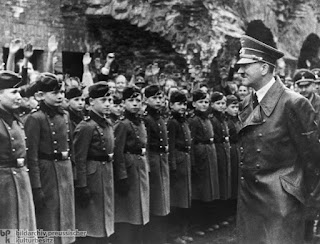PR As Tribal Magic
We are still
tribal -- but the campfire we gather around is called Facebook.
“PR” has always
existed. The earliest men had songs, legends, poetry and shamen to define collective
values, mixing, social indoctrination, individual creativity, and oftentimes entertainment. Today this time-honored (or
time-dishonored) institution is different to the extent that modern media appear different. However, while technology changes – but human
beings do not.
In terms or human
nature, is “progress” just a matter of style?
Take the 1920s.
The gap between the 99% and the one percent is nothing new. Nor Boom & Bust. Nor Prohibition. Nor new technologies that seem to change
everything. Nor the Information
Age. Nor Internationalism. What really has changed?
Back then , the “new media” – magazines, radio, movies -- were in full swing. There was literally an explosion of
communication. The first
modern version of the typewriter appeared in 1895.
And telephones became ubiquitous. People communicated as never before, more easily and over greater distances.
Obviously none of this could
have happened without a huge increase in literacy, which in turn depended on
very mundane developments in printing technology and paper manufacture. It was
not until the latter half of the 19th century that books and paper
were cheap enough for universal education to become a reality. The Germans had been first to introduce
universal education, seeing it as an instrument of indoctrination and the key to
building a strong military-industrial state, as indeed Stalin and Hitler did
later.
For Americans
education was not only a means of controlling the public and building
nationalism – it was also a way of building a new consumer market. Industry in America had evolved. And new advances in distribution and mass
production meant that you had to get people to buy things, whether they needed
them or not. And without people who could read and write,
who would buy the newspapers and magazines and so on that would tell them what
to buy?
But WWI emancipated
women and revolutionized men. People
were reading all sorts of things they weren’t supposed to – and, accordingly
doing all sorts of unexpected things. Americans looked to the decadence of Berlin
and Paris and beyond to the extremes of early Communist Russia and realized that ideas were dangerous -- if exciting.
 People like Bernays saw opportunity.
People like Bernays saw opportunity. For Bernays an educated Mob could be guided -- especially towards things like buying cigarettes and cars and new clothes and magazines – and working for these things – rather than, say, questioning the existing order – and the huge gap between rich and poor. Consumerism was the perfect foil to (say) socialism because it was based on envy and not on concepts of social justice or equality. In addition, as in Roman Times, ordinary people needed bread and circuses – vicarious pleasure. Bernays served the rich – who could enjoy the real thing, as far as hedonism went. And he rode the wave.
As Andrew Gavin
Marshal writes:
The Robber Baron industrialists of the late 19th century – Morgan, Rockefeller, Carnegie, Astor,
Vanderbilt, Harriman, etc. – were unquestionably the dominant powers in the
country. They controlled the economy, hundreds of corporations, had hundreds of
millions or billions in wealth, the banks, bought the politicians, directed
foreign policy into an increasingly imperialistic direction, and thus, they saw
it as essential to cement their control over society through social
institutions, as the masses were hateful of them and needed to be properly
controlled. Social control became the major concept of interest for elites and
middle class reformers.
So Bernays offered the Robber Barons, now the philanthropists, control. – which meant Psychology . Uncle Siggy was Big-- although no one, including Siggy himself really understood them.
This brings us
back to the tribal campfire.
For Bernay’s clients PR was a kind of magic – which they scoffed at on the one hand --but partly believed – to the extent that it worked -- sometimes. Bernays was a shaman – he performed incantations and burnt herbs and lo’ it all came to pass. And so Psychology achieved a certain respectability because the corporate class believes in outcomes not ideology. It was not art or religion as in our tribal days – but “science” and as it progressed in universities, each new generation of PR gurus would adopt a new psychic “technology”.
For Bernay’s clients PR was a kind of magic – which they scoffed at on the one hand --but partly believed – to the extent that it worked -- sometimes. Bernays was a shaman – he performed incantations and burnt herbs and lo’ it all came to pass. And so Psychology achieved a certain respectability because the corporate class believes in outcomes not ideology. It was not art or religion as in our tribal days – but “science” and as it progressed in universities, each new generation of PR gurus would adopt a new psychic “technology”.
 Half the time, PR rituals
worked. Half the time, they failed. Which drove “progress” in the field. Today we have focus groups and polling and
statistical studies. Metrics are
in. But then so was examining the entrails of goats
was in Roman times. You probably get as
much from bloody guts.
Half the time, PR rituals
worked. Half the time, they failed. Which drove “progress” in the field. Today we have focus groups and polling and
statistical studies. Metrics are
in. But then so was examining the entrails of goats
was in Roman times. You probably get as
much from bloody guts.Religious people think creationism is science, too.







Comments
Post a Comment